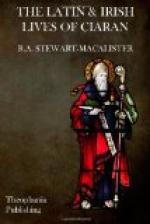The Annals of Clonmacnois preserves for us a totally different tradition of the origin and upbringing of the saint. Modernising the haphazard spelling and punctuation of the seventeenth-century English translation (the original Irish of this valuable book is lost), we may note what it tells us. “His father’s name was Beoit, a Connacht man (sic) and a carpenter. His mother Darerca, of the issue of Corc mac Fergusa mic Roig of the Clanna Rudraige. He in his childhood lived with his father and mother in ‘Templevickinloyhe’ [wherever that may have been] in Cenel Fiachach; until a thief of the country of Ui Failge stole the one cow they had, which, being found, he forsook together with his father and mother the said place of the stealth [= theft], fearing of further inconvenience.” Here note: (1) that Darerca is given the ancestry attributed in the Book of Leinster pedigree to Beoit, thus hinting at an originally matrilinear form of the official pedigree: (2) that the settlement of the family in Cenel Fiachach, i.e. the place of Darerca’s dwelling, is definitely stated; (3) that the migration of the family does not take place till after Ciaran’s birth; (4) that a totally different reason is assigned for the migration; (5) that incident X of the Lives is directly referred to; (6) that we hear nothing in this passage about the rest of the numerous family of Beoit; and (7) that the family is poor, having but one cow.
Cenel Fiachach (the clan of Fiachu) occupied a territory covering parts of the present counties of Westmeath and King’s Co. VG erroneously writes this Cenel Fiachrach, which occupied a territory of the modern Co. Sligo. See further, p. 171.
The Princes.—Unfortunately Ainmire mac Colgain, lord of Ui Neill, and Cremthann, a chieftain of Connacht, are not otherwise known; we cannot therefore test the chronological truth of this part of the story. Ainmire reappears as an oppressor in the life of Aed (VSH, ii, 295). LA anachronistically confuses this Ainmire with Ainmire mac Setna, King of Tara, A.D. 564-566.
It is noteworthy that VG calls Cremthann “King of Ireland.” This is in accordance with the fact that the dynasty which united Ireland under the suzerainty of the King of Tara was of Connacht origin.[10]
The Wizard’s Prophecy.—The phrase “the noise of a chariot under a king” is a stock formula in this connexion; compare, with Stokes, Vita Sancti Aedui in Rees’ Lives of Cambro-British Saints, p. 233 (also VSH, ii, 295). With the incident compare the story of the druid rising to welcome the parents of Saint Senan, and when ridiculed for thus showing honour to peasants explaining that it was to their unborn child that he was paying honour (LL, 1875). Observe that in both tales the druid is mocked. This touch doubtless belongs to the Christian chronicler, taking the opportunity of putting the minister of the rival creed in an invidious position.




